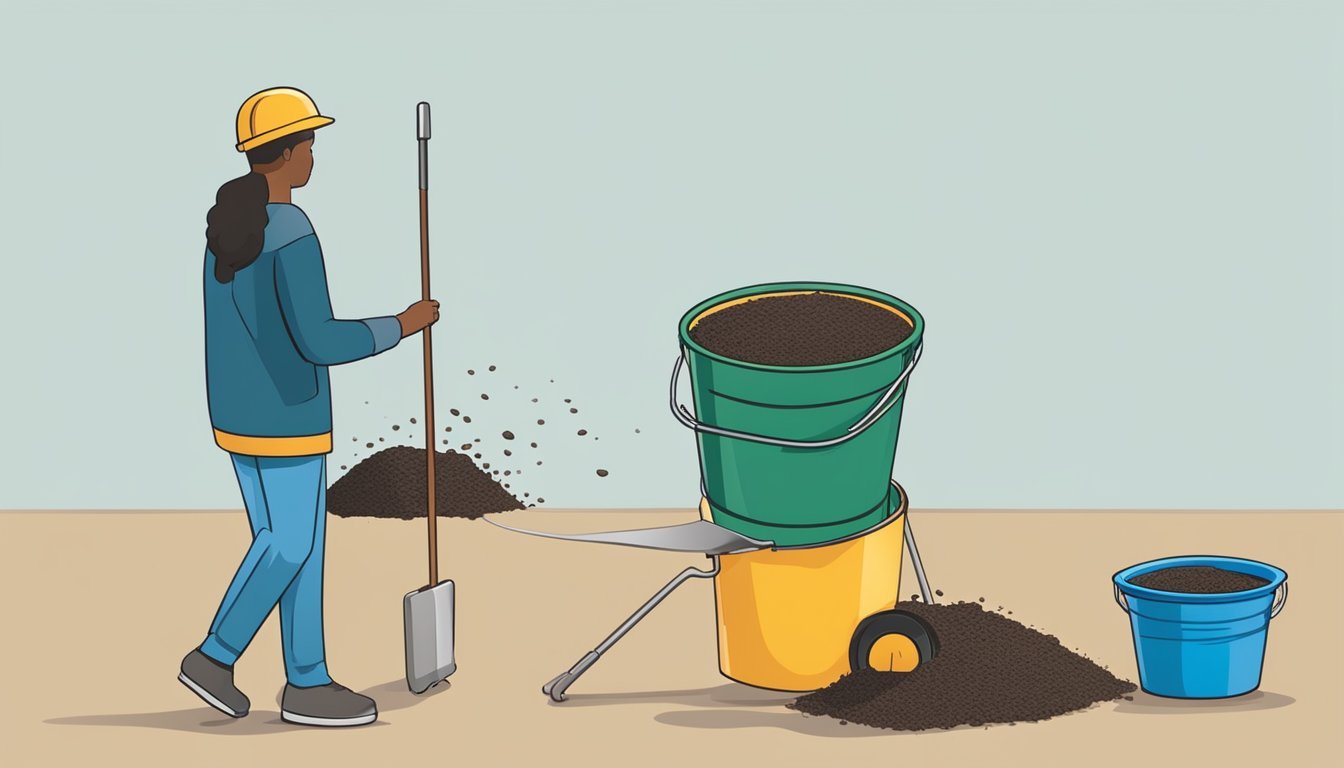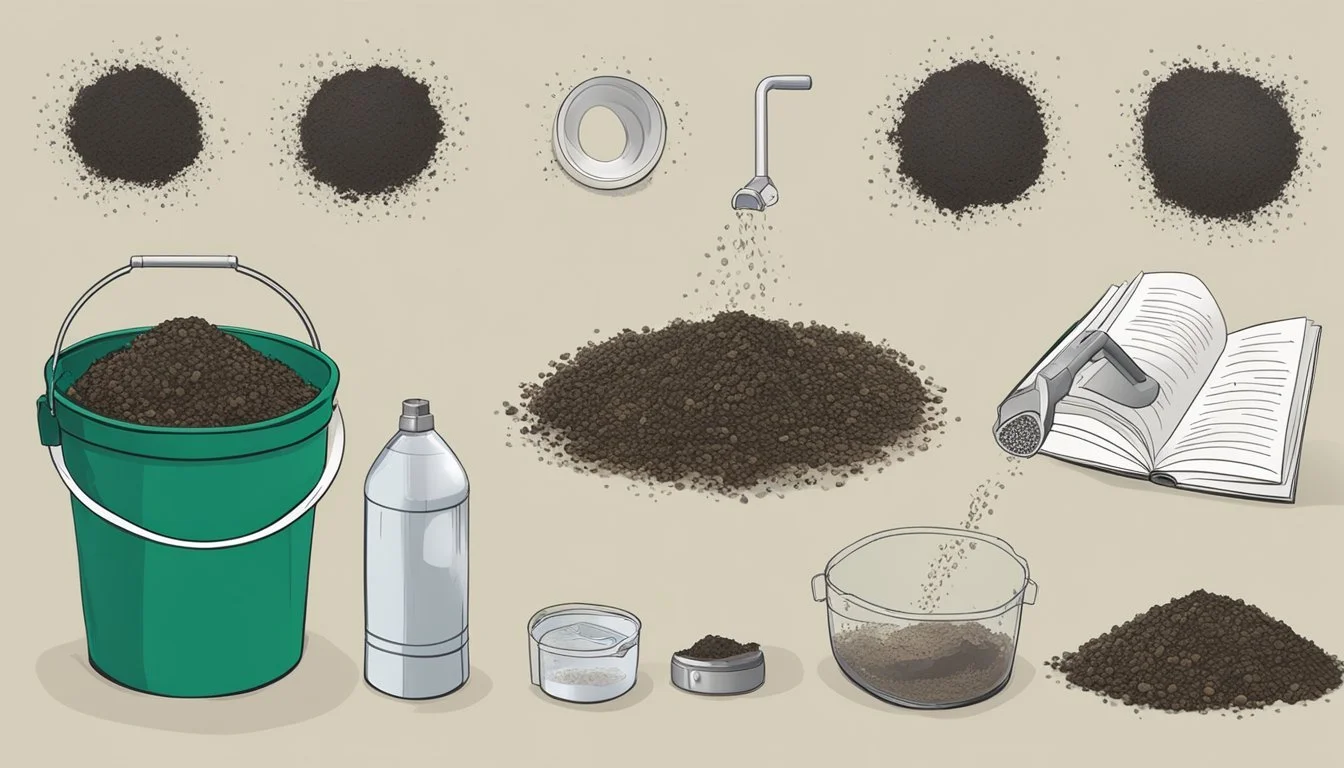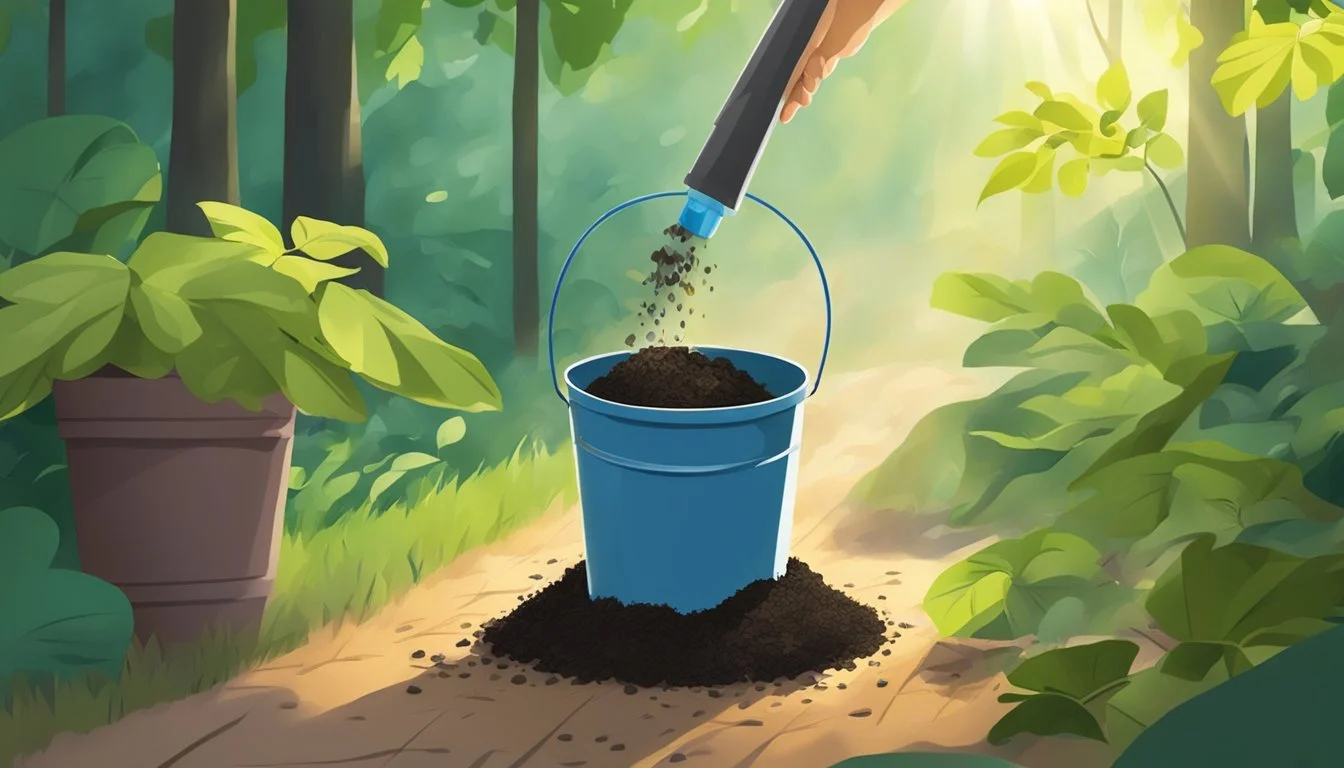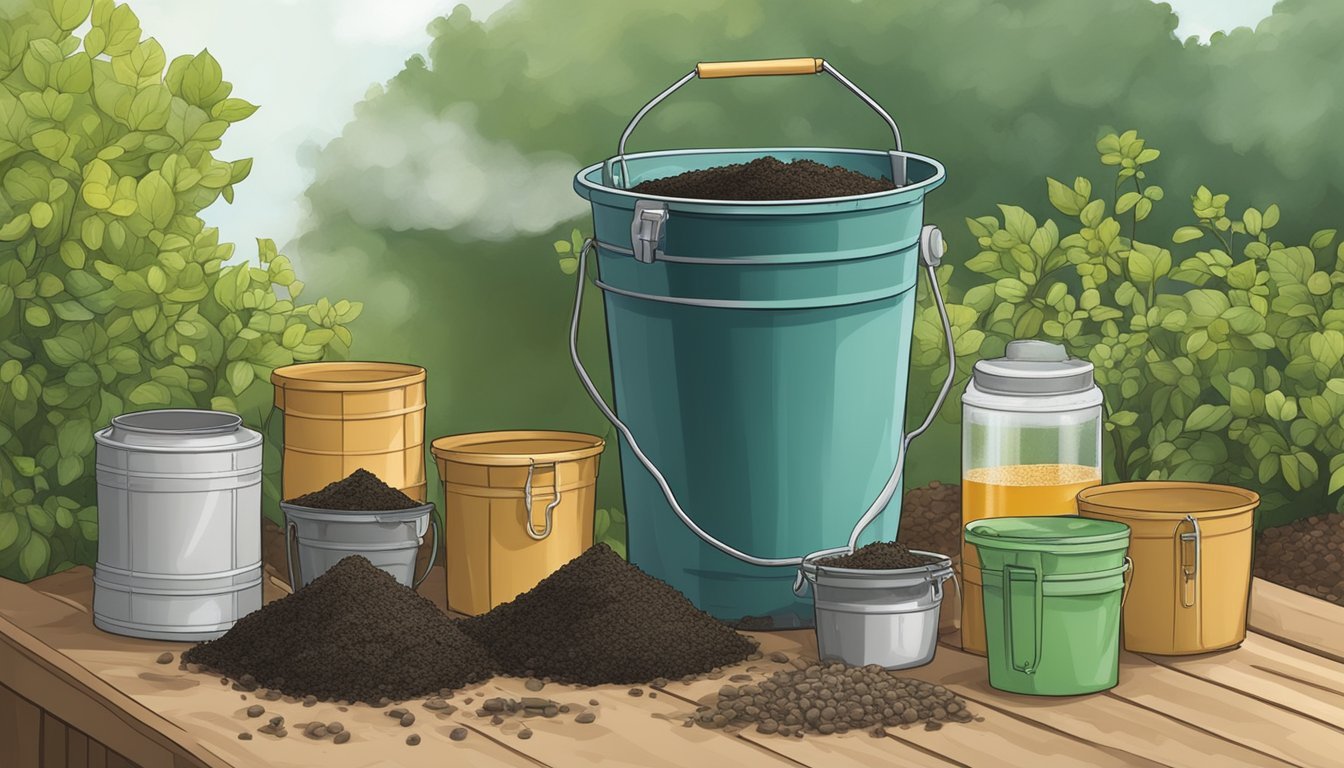How to Make Compost Tea
A Simple Guide for Nutrient-Rich Fertilizer
Compost tea is a natural fertilizer made by steeping compost in water, used by gardeners to improve soil health and strengthen plants. This practice involves combining compost with non-chlorinated water, which promotes microbial activity.
The liquid is applied to the soil or foliage, introducing bacteria, fungi, and protozoa, all of which play crucial roles in nutrient cycling, disease suppression, and soil structure enhancement.
Compost tea is a sustainable gardening practice, reducing reliance on synthetic fertilizers and contributing to a more vibrant garden and broader ecological wellness.
Understanding Compost Tea
Compost tea is a liquid solution rich in nutrients that serves as a dynamic supplement to improve soil structure and strengthen plants. This section discusses its definition, benefits, and the types commonly used by gardeners.
Definition and Benefits
Compost tea is a nutrient-rich liquid made by steeping compost in water, transferring microbial life and nutrients to plant foliage or soil. It prompts healthy soil by introducing beneficial microorganisms that suppress diseases and convert nutrients into easily absorbed forms.
Moreover, if you apply compost tea you can promote plant growth by providing your plants with the additional nutrients and microbes they need for resilience and strength.
Types of Compost Tea
There are two main compost teas: aerated compost tea (ACT) and non-aerated compost tea (NCT).
Aerated Compost Tea (ACT): This type is actively brewed with aeration equipment to provide oxygen, which encourages the growth of aerobic microorganisms. The process usually requires 24 to 36 hours.
Benefits of aerated compost teas include a high concentration of beneficial microorganisms that can help protect plants against pathogens.
Non-Aerated Compost Tea (NCT): NCT is a passive system that does not use aeration and typically takes longer to brew, up to 5-7 days.
Non-aerated compost teas still introduce beneficial microorganisms, but the lack of oxygen can also promote the growth of anaerobic microorganisms.
Gardeners choose between these types of compost teas based on their gardening philosophy, the resources they have at hand, and the specific needs of their plants and soil.
Compost Tea Ingredients
Compost tea is a nutrient-rich liquid that enriches soil and nourishes plants. To make compost tea you must include a base of compost and a selection of additives to enhance its effectiveness.
Choosing Your Base Compost
The quality of your homemade compost tea hinges on the base compost. Fully finished organic compost, which has decomposed thoroughly, is ideal due to its microbial richness. Worm castings, a by-product of worm farming, and well-composted manure from herbivores—such as cows or horses—are excellent primary ingredients due to their nutrient content and beneficial microbial populations.
Additives and Supplements
For an enhanced compost tea, one can add supplements such as:
Kelp (how long does kelp last?) meal: Provides trace minerals and growth hormones for plants.
Molasses (how long does molasses last?): Fuels the growth of beneficial microbes with its sugar content.
Fish hydrolysate: Supplies nitrogen and other vital nutrients.
Humic acid: Helps in nutrient uptake and stimulates microbial activity.
In addition to these, non-chlorinated water is essential since chlorine can harm the beneficial organisms within the tea. It's important to ensure that the water used is free from contaminants that could inhibit microbial growth.
Equipment and Tools
Making compost tea requires specific equipment and tools, including containers and aeration devices. You can make your own DIY compost tea brewer by using a 5-gallon bucket made of non-toxic materials to avoid leaching chemicals.
Aeration devices, like bubblers or aquarium pumps, are crucial for the tea's health and effectiveness. Accurate measuring tools are needed for ingredients like molasses, which serve as a microbial food source.
A scoop or cup is used to add compost into the brewing vessel, while a clean long-handled spoon or stick is used for stirring. A strainer or cheesecloth is needed to separate solids from liquid tea, ensuring only beneficial liquid is applied to plants.
Preparing Non-Chlorinated Water
To make compost tea, using water free from chlorine is essential. The presence of chlorine can inhibit microbial activity, which is crucial for the compost tea to be beneficial. Ensuring the water used is non-chlorinated helps maintain the efficacy of the compost tea.
Therefore, compost tea requires safe water for brewing, with rainwater and well water rather than tap water, being the most suitable choices.
Rain water collection and storage can provide non-chlorinated water, while well water should be periodically tested for quality.
For gardeners without access to rainwater or well water, dechlorinating tap water is necessary to remove chlorine. This can be achieved through several methods:
Stand the water in an open container for at least 24 hours. Chlorine will naturally dissipate into the atmosphere, negating its adverse effects on the beneficial microbes within compost tea.
Boil the water for around 20 minutes to speed up the dechlorination process as chlorine evaporates at a quicker rate with heat.
Use dechlorinating agents available from garden or pet stores designed to neutralize chlorine, following the manufacturer's directions.
One must ensure that the chosen method of dechlorination effectively removes chlorine without introducing other harmful substances to the compost tea.
Brewing Process
In brewing compost tea, attention to aeration, timing, and temperature ensures the proliferation of beneficial microbes. Proper oxygenation and regulated conditions yield a nutrient-rich tea, optimal for plant health.
Step-by-Step Brewing Guide
Water Preparation: Begin with non-chlorinated water. If tap water is used, let it sit for 24 hours to allow chlorine to dissipate or use a chlorine filter.
Compost Selection: Choose well-aged, finished compost to avoid harmful pathogens. Worm castings are a safe option, containing essential bacteria and fungi.
Mixing: Add 2-6 cups of compost to a brewing container, typically a 5-gallon bucket, then fill with your non-chlorinated water.
Additives: Optionally, add unsulfured molasses or a similar food source to feed the microbes during the brewing process.
Aeration and Oxygenation
Aeration Equipment: Employ an air pump connected to an airstone placed at the bottom of the brewing container. This setup supplies oxygen, which is crucial for fostering aerobic conditions.
Oxygenation: Ensure continuous aeration. Oxygenation prevents anaerobic conditions, which can cause harmful bacteria to flourish.
Aerobic Environment: Maintaining an aerobic environment is key for the growth of beneficial microbes throughout the brewing process.
Brewing Time and Temperature
Duration: For most compost teas, a brewing time of 24 to 36 hours is ideal. Extended periods may lead to anaerobic conditions and diminished efficacy.
Temperature Management: Keep the brewing mixture at consistent air temperatures, ideally between 65°F and 75°F (18°C to 24°C). Extreme temperatures slow microbial activity or breed unwanted pathogens.
Using Compost Tea
Compost tea offers a multitude of benefits to plants when applied correctly, either by enhancing leaf health or by boosting soil vitality. Recognizing the proper application technique is essential to the efficacy of this organic liquid.
Foliar Application
Compost tea can be used as a foliar spray on houseplants and vegetables, with a 1:10 water-to-tea ratio.
Misting in the early morning or late afternoon allows leaves to absorb beneficial microorganisms without the stress of the midday sun.
Soil Application
Alternatively, compost tea can be used as a soil drench, directly benefitting garden soil and plant roots, and promoting root health and nutrient uptake.
It's also beneficial for outdoor plants like vegetables as well as houseplants, providing a sustainable nourishment source, and can be used with a watering can for even distribution.
Optimizing Compost Tea Effectiveness
Optimal compost tea effectiveness hinges on tailored nutrient provision and microbial support to meet specific plant requirements.
Understanding Soil and Plant Needs
To optimize compost tea for plant growth, one must first assess the soil and plant nutrient needs. Different plants have varied requirements for nutrients and microbial environments. Growth and yields can be significantly improved when compost tea provides the right balance of nutrients and beneficial bacteria. For instance, vegetables may require increased nitrogen for leaf development, while flowering plants might benefit from higher phosphorus levels.
Key Nutrients for Plant Growth: Nitrogen (N), Phosphorus (P), Potassium (K)
Beneficial Microbes: Mycorrhizal fungi, Trichoderma, Rhizobacteria
One technique is to perform a soil test to determine the existing nutrient levels and then adjust the compost tea accordingly to fill any deficiencies.
Testing and Adjusting Compost Tea
Creating quality compost tea involves not only brewing but also testing and adjusting its contents to ensure plants receive the maximum benefit.
During the brewing process, one should monitor the tea for pH levels and microbial activity. The pH of the tea should ideally be close to neutral to facilitate the absorption of nutrients by plants.
Testing Parameters:
pH: Typically aim for 6.0 – 7.5
Microbial Activity: Use a microscope or testing kit
After testing, adjustments might include:
Aeration: To increase oxygen levels, promoting aerobic microbes
Nutrient Additions: Based on soil test results, add specific nutrients lacking in the soil
Foliar Application: Adjusting application method can also enhance effectiveness. A foliar spray allows microbes and nutrients to be absorbed directly through plant leaves, potentially increasing yield and plant growth.
By understanding the target plants' needs and meticulously adjusting the compost tea composition, gardeners can effectively increase yield and improve plant health.
Safety and Troubleshooting
When making compost tea, it's crucial to ensure a safe product free of harmful pathogens while also knowing how to address common issues that may arise during its preparation.
Preventing Harmful Pathogens
Compost tea can occasionally harbor dangerous bacteria if not prepared properly. To prevent this, use mature, fully decomposed compost that has been heated to kill harmful organisms. Continuous aeration promotes beneficial microorganisms and suppresses disease-causing pathogens.
Proper sanitation practices, including cleaning equipment before use, are essential to avoid contamination.
Solving Common Issues
Uneven Fermentation: If the tea isn't aerated enough, it can lead to anaerobic conditions which aren’t conducive to the growth of favorable microorganisms. Ensuring that your aeration system, such as an aquarium pump with air stones, is functioning correctly will resolve this.
Mold or Bad Smell: This is usually a sign of insufficient aeration or a too high concentration of compost. Adding more water to dilute the mixture or increasing aeration can help.
Pest Attraction: To avoid attracting flies or pests, keep the brewing area clean and ensure the tea doesn’t sit for too long post-brew.
For each of these issues, prevention is key, but quick identification and action are essential in solving them without endangering your plants or soil.
Sustainable Practices in Compost Tea Making
Creating compost tea is a process that synergizes well with sustainable agriculture. By prioritizing locally sourced inputs and eco-friendly compositing methods, one can enhance soil vitality and plant health without the harmful environmental impacts often associated with synthetic fertilizers.
Utilizing Local Resources
Local resources are the cornerstone of sustainable compost tea preparation. Collecting fresh organic material from one's immediate environment reduces emissions associated with transportation and supports the local ecosystem's balance. Resources include:
Food scraps: Vegetable peelings and fruit waste provide the necessary green, nitrogen-rich material.
Garden waste: Grass clippings and plant trimmings add diversity to the compost mixture.
Animal manure: Utilizing manure from local farms enriches the compost with essential nutrients.
By focusing on these resources, gardeners ensure that their finished compost tea is as fresh and organic as possible, which is beneficial for promoting healthy plant growth.
Eco-Friendly Composting Techniques
Adopting eco-friendly compositing techniques is vital for maintaining the integrity of the compost tea and the wider environment. Key techniques include:
Aerobic Composting: Ensuring compost bins are well-aerated encourages beneficial microorganisms and speeds up decomposition.
Balanced Material Ratio: A mixture of approximately 30% green and 70% brown materials creates an optimal environment for compost formation.
Regular Maintenance: Turning the compost pile regularly and maintaining moisture aids in producing quality compost that is ready for brew.
These practices not only yield rich compost for tea making but also contribute to a more sustainable approach to agriculture and reduce the need for chemical alternatives.
Compost Tea Recipes and Variations
Creating compost tea can be an effective way to enhance soil and plant health. It acts as a liquid fertilizer that can be tailored to meet specific plant needs.
The two main variations include a basic compost tea recipe for general use and custom blends that address the particular requirements of various plants.
Basic Compost Tea Recipe
Ingredients:
Compost: Rich in organic matter
Water: Preferably non-chlorinated
Molasses: Unsulfured, as a microbial food source
Air Pump: To oxygenate the mixture
Instructions:
Fill a bucket with water and add a couple of handfuls of compost.
Stir in an ounce of unsulfured molasses to feed the microbes.
Use an air pump to aerate the mixture, ensuring oxygen is supplied to the developing microorganisms.
Let the mixture brew for 24-36 hours before application.
A basic compost tea recipe should not steep for longer than 36 hours to avoid harmful bacteria like E. coli or salmonella.
Custom Recipes for Specific Plant Needs
Different plants may require specific nutrients, which can be provided through customized compost tea recipes.
For Nitrogen-Loving Plants:
Add liquid kelp fertilizer or incorporate greens, such as grass clippings or straw, to the compost.
For Flowering Plants:
Sugar sources or molasses can be increased slightly to provide more carbohydrates, boosting microbial activity that is essential for bloom development.
Experiment with compost, molasses, or liquid kelp to find the ideal garden recipe, but avoid excessive concentrations to avoid harming plant roots or soil microbiota.
Conclusion
Compost tea is a valuable fertilizer that enhances soil health by introducing beneficial microorganisms that are crucial in nutrient cycling and disease resistance. Consistent use leads to robust plant development, particularly in vegetables and fruits, which thrive on the additional nutrients and protective barrier provided by compost tea. This simple act promotes a natural, defensive environment against disease, resulting in healthier, more vibrant plants and more successful vegetable gardens and fruit orchards.
For best results, it's recommended to:
Brew compost tea properly, maintaining an aerobic environment.
Apply it promptly to ensure maximum viability and effectiveness of the microorganisms.
Integrate compost tea application into regular garden maintenance for consistent benefits.
Adherence to these practices ensures that one harnesses the full potential of this organic solution, thereby supporting a sustainable and flourishing garden ecosystem.






